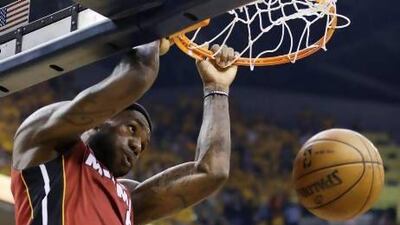The NBA's finals no longer are merely a best-of-seven series in which the league finally sorts out a champion. Basketball's premier competition now also comes freighted with Big Questions that will be answered, it is hoped, by the outcome of the event. Unofficial but closely watched referendums, if you will, on how to build a team, how to prepare it and where in the pantheon of NBA history these two teams and their various players fit.
San Antonio Spurs are the less-glamorous, less-celebrated side, but several of these sidebars pertain to them.
If they can win a championship, their fifth since 1999, does it make them the best franchise of the past 15 years, supplanting the Los Angeles Lakers? Does it mean that Tim Duncan, their focal point for nearly the whole of that period, should be more generously regarded when sorting out the greatest power forwards to play the game? Behind Larry Bird, perhaps, but ahead of nearly everyone else?
Also, would a fifth championship for Gregg Popovich, the Spurs' prickly yet deeply insightful coach, secure him a place among the league's elite, only a bit behind the likes of Phil Jackson and Red Auerbach? And would San Antonio's approach to building a team be recognised as the model for well-run franchises, going forward?
The Spurs are greater than the sum of their parts, and have been for a decade. They are a collection of role players with a couple of not-quite-superstars leading them, the duo being the French guard Tony Parker and Duncan. Is the egalitarian (and economically sensible) wave of the future a process of collecting unheralded athletes who can be taught to sublimate themselves for the collective? Or is all of that a warm and fuzzy dead end?
On the other end of the court, we have Miami Heat, and they present a basket of questions waiting to be answered, as well.
Is the NBA irrevocably a stars league? Should teams without at least two of the league's 15 best players just accept they cannot win?
How many championships must this group's core, expensively and controversially brought together nearly three years ago, win before it was worth the effort and before it justifies the means? They have one title, last year's. Would two be enough to declare victory for Pat Riley, the Heat president and architect of this team? Three? Four?
Was the jolt of LeBron James and Chris Bosh joining Dwyane Wade a once-in-a-generation accident of friendship and timing, not to be replicated soon? Or the death knell for every franchise without the weather, cash flow and civic attractions sufficient to lure and keep elite players?
It seems we need to see this one before we can begin to be certain.
And, at the very centre of all these questions we find the imposing figure of LeBron James, the best and most divisive player of his generation.
He seems to have outstripped Shaquille O'Neal, Kobe Bryant and Duncan as the most influential player of the past decade. He has four MVP trophies now; Michael Jordan and Bill Russell won five; Kareem Abdul-Jabbar won six. James seems destined to catch them, but can he join the ranks of those all-time greats if he does not win a second, third, fourth, fifth title, as well?
It is notable that a significant fraction of all basketball fans reflexively wish for James to fail. Their motives are varied, but they seem to cluster around the notion that the game is too easy for him, that his unparalleled blend of speed and athleticism is more about genetics than will or moxie.
Also there are the two failures of James-led teams in NBA Finals, in 2007, while he was with Cleveland Cavaliers, and in 2011, when an unremarkable Dallas Mavericks team rolled over him and the Heat. And, finally, the notion of his abandoning Cleveland, a few miles from his hometown of Akron, was seen as a betrayal and as a signal he could not win alone; he required the presence of two other top-tier players, unlike, say, Bill Russell or Michael Jordan.
Even James's harshest critics, however, acknowledge that his performances since Game 6 of the 2012 Eastern Conference finals, when he led the Heat into Boston, on the wrong end of a 3-2 deficit, and left the Celtics a smoking pile of rubble, are making it hard to find flaws in his game or in his latterly developed killer instinct.
The Spurs will come up with deeply technical schemes for keeping James from overwhelming them, but they have no one like Roy Hibbert, the Indiana Pacers man-mountain, who seemed to keep him away from the basket like no one else in the league. Kawhi Leonard, Tiago Splitter and the rest of the Spurs will have to keep James from running amok, or this could be over quickly.
In the arena of competition, fans of sport are usually happy to find systems and styles at odds with each other. This way or that? Speed or size? A team or a star?
Coaching players or collecting them?
This much seems clear: James, at 28, is such a transcendent talent it is impossible to imagine the Spurs sweeping him away, as they did in four games in 2007. This will be a grinding, one-possesion-at-a-time San Antonio seminar, or a Miami victory parade-cum-James dunk-fest.
The league's two best teams, seven games, if needed, to sort it out, to answer the questions. Basketball fans are keen to get some answers.
Follow us

